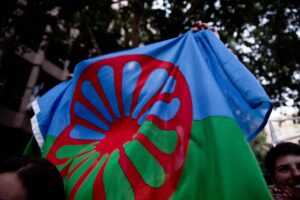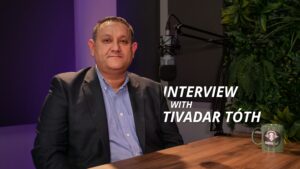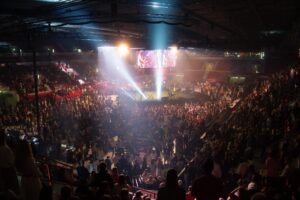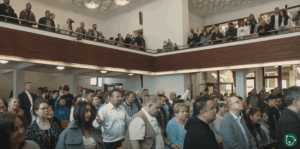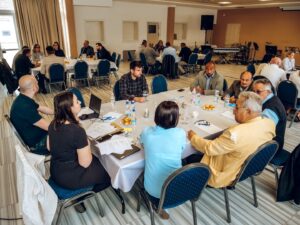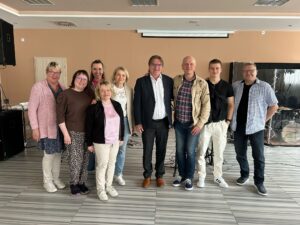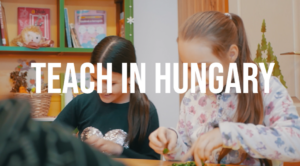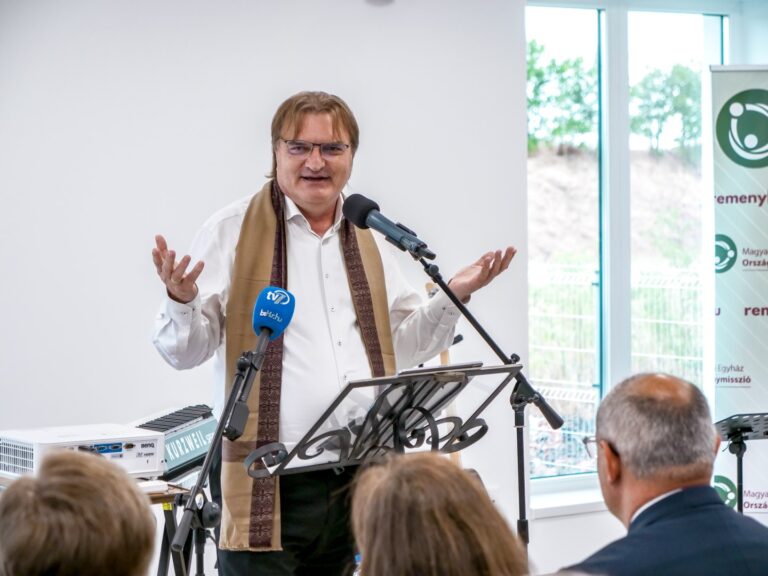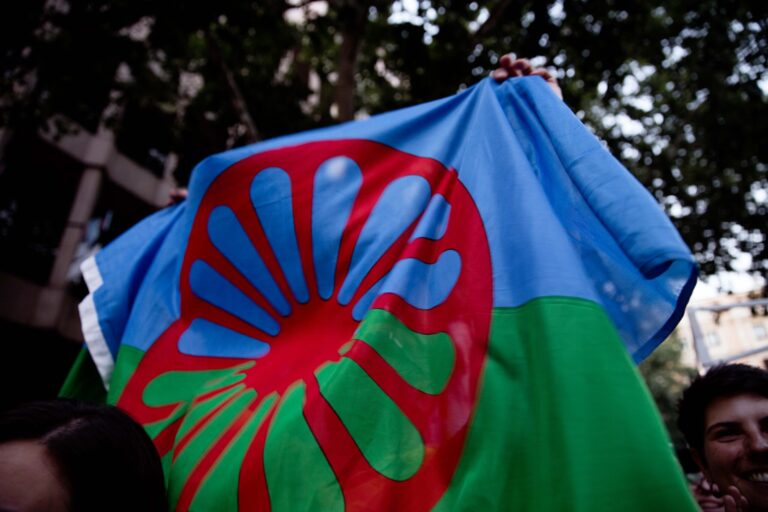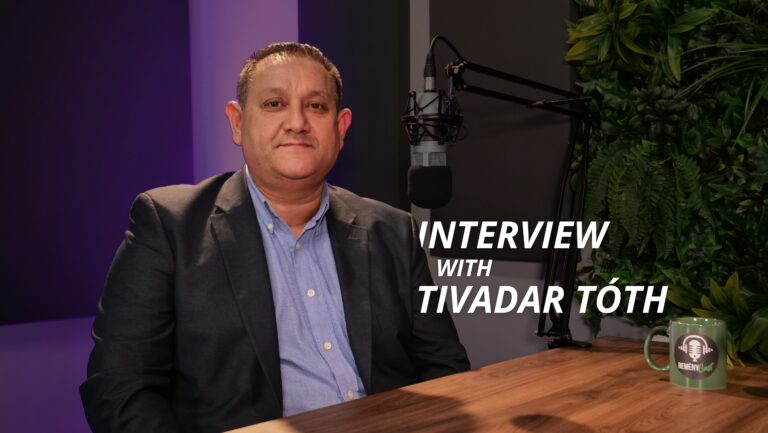The third guest of our podcast episode is Pál Péter, the executive elder of the Hungarian Gypsy Missions International.
He was born on January 30, 1977, in Dicsőszentmárton, Transylvania. His father was a mechanic and blacksmith, and his mother was an entrepreneur. He has six siblings, and Pál is the firstborn child. His childhood was spent under difficult circumstances; he started working early, took care of animals, looked after his siblings, and had little time to study, but he completed the eight grades of primary school. In 1989, with the opening of the borders, the family moved to Hungary, settling in Balástya. They first started working there. He met his wife, who was born in Nagyvárad, in Hungary, and theirs was a workplace romance. In 2001, he got married, and with his wife Edit, they moved to Pusztamérges, then to Ruzsa, and subsequently to Zákányszék. Their first child, Melinda, was born in 2003, and it was in this year, at Easter, that they pledged eternal faithfulness to God. This occasion was the one that changed their lives forever. By 2006, when their second son, Dávid, was born, their congregation in Zákányszék had already been established. By the birth of their third child, Manassé, God had already performed several wonderful things within the family. In 2011, he joined the Hungarian Gypsy Missions International, and he currently serves the mission’s congregation in Zákányszék. He has established congregations in 17 locations in Bács-Kiskun, Csongrád counties, and Transylvania. Recently, he became an executive elder of HGMI and completed his high school diploma at the age of 45. Family is important to him, as is education; he is currently attending college and building God’s kingdom.

You came from Romania, Transylvania. How, under what circumstances did you live there? What was your family like, who were your parents and siblings?
I had a very difficult childhood in Romania, growing up in Erdőszentgyörgy. As a child, I lived every moment and grew up in a way that was difficult every step of the way. I felt that everything had to be fought for, everything required effort. My parents worked very hard, we were left alone a lot when I was a child, and my brothers and sisters, as they came along, I had to look after them, because I was the first born. As a Roma family, our life was very difficult. I went to school, I really liked learning and so it was very important for me to continue my education, even now.
What was your relationship with your parents like?
My parents were very young when I was born, so they couldn’t really give me the love that I probably needed as a child. They certainly loved us very much, but they couldn’t express it. My father and mother were separated quite a lot. So I was brought up by my grandmother for a very long time, I spent a lot of time with her.
In Romania, the Roma nationality was not counted among the recognized nationalities. This probably put you at a disadvantage.
Yes, the disadvantage was mostly noticeable in school. As a child, I didn’t feel this disadvantage so much, only at school when it was stated that I was Roma. I didn’t understand what it meant or why I should be any less because of it. At the same time, I experienced all aspects of being a minority because we often had no food or basic necessities, and I was often sick…
Many people judge the Roma community. Racism is very present in our everyday lives. What is the reason for this?
Racism is a concept that unfortunately is present everywhere. I think people judge based on where we come from, who we are, and our background. The word Roma often conjures up images of theft, deceit, and lies. Today, we want to prove that this is not the case. So, when it comes to Roma, not everyone is cheating, stealing and lying, but there are people who are trying to live a normal life, and in fact there are many Roma people who are living a normal life, who have graduated from very good schools and who are very valuable.
Where does this way of thinking about the Roma come from among non-Roma people?
People think based on prejudice, and this is passed from mouth to mouth. Parents talk about it at home in front of their children, and the children then say it at school, calling others Roma boys. This creates a sense of withdrawal and fear in the children, and they grow up this way. That’s how racism grows, that there are people who think of themselves as more than the other. Because someone is a little bit darker in colour, they think they are a bad person. The prejudices are enormous, but we aim to prove that this is not the case.
What happened to you after you completed primary school?
After I finished primary school, we moved to Hungary in 1989. Those were very good times, because before that we couldn’t really buy anything, there was nothing in the shops, they were all empty. Bread could only be bought in limited quantities, with a daily ration of a quarter kilo per person. There was no meat, chocolate, or anything like that in the stores. When the border opened, there was an explosion of people leaving – and of course we left with them, hoping for a new life.
How did you see life, opportunities, and the Roma community here?
I saw this when I was saved, when our first congregation was formed. At first, it was primarily people from Zákányszék, and when we prayed for awakening and for more people, I met my brother László Surman, who came to talk to me and asked if there were any Roma people. This was the first time I realized the difference between Roma and non-Roma. I thought, isn’t it all the same? Just our family, I said. And he said we should prophesy that there would be more because their leader was a young Roma man, so he was sure there would be, and that year 26 Roma brothers were baptized. And that’s when I saw the difference between Roma and non-Roma because unfortunately, many non-Roma left our congregation. I know that to this day they watch our live broadcasts, but it’s difficult for them to accept this because we’re talking about a Roma congregation.
How did you meet your wife?
It was so wonderful the first day I saw her, and I didn’t know I was going to see her. It was just like any other day, I came to work and she was already there and I asked her who she was and she told me that she was coming to work and I felt that there was something special between us because at first sight I really liked her and I was very fond of her. God brought us together like this. I could talk a lot about why I received my wife. After meeting my wife, we got saved. Within three months, my wife learned to play music because there was no one to play music in the church, no one to lead worship, and it was so clear that God brought her forward, that the two of us formed a whole team. She sang, I preached and evangelized, and people turned to God. To this day, I see that she was the one God wanted for me even before I knew her. And that’s a miracle.
How did that miracle happen when you met God? What is that moment, what is that point?
That was the most beautiful moment of our lives. When I married my wife, she also came from a background where God was known as someone to talk to and pray to. It was Easter when we were invited to a church in Kistelek, and we didn’t know that this would change our lives. The word of God touched us wonderfully. And I have to talk about this. Because my parents were young, they couldn’t give the love I wanted and needed. I felt like nobody loved me. I longed for recognition and a little love, but I didn’t get it anywhere. And what changed my life in that church was when the pastor came from the front to the back and hugged me. I didn’t know why. I didn’t know him. I couldn’t place this feeling, but it felt good, and God spoke to me, I opened my heart, and something opened up in me, the chains fell off my life, the hard heart I had, thinking nobody loved me, nobody cared about me, fell away. I longed for that embrace again, and that’s why I went back to the church. And I got it, and it changed our lives. Together with my wife, we decided to give our lives to God. I took her hand, we went forward, and we stood before God, and the pastor of the Kistelek church prayed for us, and from that moment on, our lives completely changed.
And the struggle you brought from your childhood led you to a new goal from that moment on.
Well, I think now that everything that happened to me, it had to happen. That’s what makes me who I am. The things that God has led me through, I’m benefiting from today. I feel that every setback that I have had is now a testament to my resilience, and it is because of these things that I never give up and that God always teaches me that I can come out victorious in anything. So I came to know God and from that moment on our hearts and our lives have been set on that. God’s work came first in our lives.
How do you see yourself in the eyes of Christ?
Now I know who I am. As a child, I didn’t know. As a child, my life was aimless, but now I know who I am, I know where I’m going, and my life has a purpose.
How do we respect our Roma identity? How can we love ourselves the most, what do we need to do?
Well, it is very important that when I respect myself, then I pay attention to how I live, whether I am a valued person among my fellow human beings, in the village where I live, or whether I represent something else. For me it is very important. It has always been essential for me to represent values, to be valuable in the place, in the village where I live, where I am.
Learning is important to you; you passed this on to your children, as you also studied and graduated from high school at the age of 45.
Yes. I never thought or imagined that at the age of 45, I would want to study. My brother László Surman was a great support and example to me, who always taught us and told us that learning is important. I had all sorts of excuses for why I shouldn’t study, but he persisted and believed in me that I could do it, so I enrolled in school. It was very difficult to get back into the habit of thinking and studying again, while also managing the congregations, but I did it. So I graduated from high school at 45, and it was a very good feeling to be able to say that I did it.
And you continued further and also participated in the Community Transformational Leadership training and other training sessions initiated by the mission.
This is very important. The mission, the Hungarian Gypsy Missions International always dealt with this, and it was important for us to continue learning. We were given the opportunity to study every year, and I wanted to study and learned a lot. I successfully completed every Bible school initiated by the mission, and perhaps these laid the foundation for my life, and now I am attending college, and I really enjoy it. I study and teach, and this is the only way to break out, to gain values.
If you could summarize for me what your ministry is about?
Initially, when the church plants began, I only saw that we needed to go, carry people, provide spiritual care, and talk to them. But we learned a lot from the mission; I participated in many types of training, leadership programmes, and now I see it differently. Now I see that when I enter the church, there are people we need to teach and send out so that more churches can be formed. I specifically teach these people, train leaders. Currently, we are present in 17 places, and in 17 places, there are local leaders assigned by me, with whom I work every week, and they go out and plant churches. So my thoughts have changed so much that now I don’t want to go, but I look for people to train, and they go out and plant churches.
This multiplication is the foundation, as we proclaim that 325,000 Roma people will be saved.
That’s right. I think that this is important for us, because God also thinks in this way, that He came to redeem the world, to redeem humanity, and we would like to be God’s co-workers in this, to touch and address as many people as possible, to find as many of our fellow citizens as possible, to seek them out, to evangelise them, so that they may come to know our great and wonderful God.
The mission also recognized this work, this service. You became an executive elder. What does this mean to you?
Well, it means a lot to me, because as I said, I started out aimlessly, there were no good examples before me, and now that I’ve become an executive elder, it means everything to me. It proved to me that it is worth fighting, persevering, and focusing on God because if you do, you have a future. God planned my life; I never wanted to reach these levels. As I walked this path and prayed, “Lord, You know how to proceed, where You want to lead my life, I am ready,” and I see that I placed my life in good hands. My life is in God’s hands, my family’s life is in God’s hands, and being an executive elder is also God’s providence and His will. I don’t know where it leads next, but I feel good knowing I can be an important person within the Hungarian Gypsy Missions International.
Do you have a particular Bible verse or thought in your mind that you would share with us?
It’s very important to me that Jesus Christ is the good shepherd. This has always given me strength when I read this verse, to trust my life to God. The 23rd Psalm reflects this best: “The Lord is my shepherd, I shall not want.” The young man I was, who lacked, no longer lacks because I chose the Lord Jesus as my shepherd. He is the good shepherd who took care of me, takes care of us, and I based my life on this, that in every way, we must listen to the good shepherd. The 23rd Psalm goes on to say, “He makes me lie down in green pastures, He leads me beside the still and restful waters.” This means to me that God does everything to ensure that my life goes in a good direction, where I have blessings, peace, and calm, where I can focus on God, and my life can be a good example to others. We want to prove to everyone that a Roma person can also be very good and wants to be good if given the chance to be good and can be valuable. When we talk about the church, it’s not just our task to have people come and find a religion, but we want a complete lifestyle change. We want to be noticed, to see the values in us, that we try and do everything to be valuable, to be there in society if help is needed. We don’t want to take from this whole thing or gain any benefit, but we want to show that we are there, we want to love, help, and be hope in people’s lives. If they can’t solve something, we are there and solve it. So I would like to close with one sentence: we, the Hungarian Gypsy Missions International, Zákányszék and its area, Csongrád-Csanád county, and Bács-Kiskun county, work to show hope to people even in hopeless situations.





